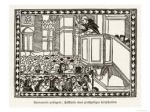The 21st Century Retooling of the Church – Part XXIV
 I recall going to a Prayer and Praise meeting in the mid 1970’s in somebody’s home where you actually “anticipated” that the Holy Spirit would show up. You never knew in what form or how he would manifest himself, what gifts would be released, if healings would become present. All you “knew” was that everyone who attended “anticipated” the Holy Spirit’s Presence to be in their midst, producing great “excitement”.
I recall going to a Prayer and Praise meeting in the mid 1970’s in somebody’s home where you actually “anticipated” that the Holy Spirit would show up. You never knew in what form or how he would manifest himself, what gifts would be released, if healings would become present. All you “knew” was that everyone who attended “anticipated” the Holy Spirit’s Presence to be in their midst, producing great “excitement”.
We were amazed that there was a spontaneous Prayer and Praise gathering somewhere in the county where I lived every morning, afternoon, and evening of every day of the week. Most often they were in people’s personal homes. There was no set agenda to their gatherings. Only one thing could be assured: Not only would believers in Jesus gather; but the Holy Spirit would show up in their midst.
I attended on several Friday nights at the home of a man who had polio. He would sleep in an iron lung in his bedroom, yet come out and lead singing at the Prayer and Praise session in his home. I lead a group for six weeks around a campfire prior to a local evangelistic crusade. There I witnessed testimonies, sharing of scriptures that had personally touched people, a women read a poem she had written bringing finality of her grieving process, and the gifts of the spirit being released on the last night. You found yourself “excited” about wanting to come back each week because you “anticipated” that the Holy Spirit would show up bringing “excitement” while producing “life”. Amazingly none of these spontaneous groups were directly under the banner of the institutional Church of its time. They were all created out of the need for spontaneity, out of the need to find an outlet to express oneself spiritually, out of a hunger to know God, have an intimate vibrant relationship with Him, and actually see Him work in lives of common people, out of the need to find “life” within a church structure. Unfortunately, most of these groups dissipated when the local churches felt they needed to “oversee” and eventually control the activities that these groups advocated. With the control, which opposed the freedom that had created the anticipation, excitement, and life within the group became stagnation bringing eventual death.
One exception came at the Lower Octorara Presbyterian Church in Parkesburg, Pennsylvania where the Rev. Jim Brown, set aside his traditional liturgical church service format, practices, and traditions for an open Prayer and Praise format on Saturday nights for over a twenty year period where people from all over the state, country, and world packed out his facility in a worship atmosphere lead by “unplanned” special music and personal testimonies from those who attended. I attended several of these sessions the last year that they were held and marveled at how the church building was always filled to capacity, the singing vibrant, and the testimonies original and powerful. Before the service ever began, you could feel the excitement and the anticipation of what the Holy Spirit would do that night.
 The 21st Century Church needs to retool, rethink, re-evaluate establish mindsets of how it does worship. Many churches have professional worship teams and choirs that sound awesome, but have lost the spontaneity that small group worship sessions once harbored. Well orchestrated programs have replaced the “anticipation” of the “unexpected” that the Holy Spirit brings. Professionally delivered sermons by Senior Pastors and staff have replaced the spontaneous sharing of personally testimonies of common believers that want to share what God is doing personally in their lives. With everything so well planned by the leadership of the church, there is nothing to “anticipate”. Everything is predictable. The excitement is gone because nothing is required of the common believer in a well scripted service except his “financial” contribution. Although the music and sermon were excellent, the parishioners, the common believers, leave the service with little if any spiritual life or renewal because nothing was expected of them. Leadership did not anticipate their involvement since they produced the worship and teaching atmosphere, and the service fulfilled the needs of “release” musically for the musicians on the platform and intellectually for the preacher, but did not necessarily fulfill the needs of the congregation because they were not afforded the opportunity to be “released” in their gifting or passions.
The 21st Century Church needs to retool, rethink, re-evaluate establish mindsets of how it does worship. Many churches have professional worship teams and choirs that sound awesome, but have lost the spontaneity that small group worship sessions once harbored. Well orchestrated programs have replaced the “anticipation” of the “unexpected” that the Holy Spirit brings. Professionally delivered sermons by Senior Pastors and staff have replaced the spontaneous sharing of personally testimonies of common believers that want to share what God is doing personally in their lives. With everything so well planned by the leadership of the church, there is nothing to “anticipate”. Everything is predictable. The excitement is gone because nothing is required of the common believer in a well scripted service except his “financial” contribution. Although the music and sermon were excellent, the parishioners, the common believers, leave the service with little if any spiritual life or renewal because nothing was expected of them. Leadership did not anticipate their involvement since they produced the worship and teaching atmosphere, and the service fulfilled the needs of “release” musically for the musicians on the platform and intellectually for the preacher, but did not necessarily fulfill the needs of the congregation because they were not afforded the opportunity to be “released” in their gifting or passions.
The 21st Century Church has to examine what “releasing” means: releasing the “believer” to be what he has been developed and equipped to be in Jesus. Allowing this releasing to be done in a safe, loving, and developing atmosphere where mistakes can be made and lessons can be learn while one grows spiritually in “their faith walk and journey”.
Although my local church believes it has made changes, when my children, now adults living away from home, return to visit, they claim “nothing has changed.” It is the same predictable “order” of worship as when they were a child. The faces of the clergy who gives the sermon and the worship team who plays the instruments have changed, but the agenda is the same. The only thing different is the “style” of music played, reflecting the current worship leader’s bent of leadership, or the delivery by the current pastor in his sermon. It is “assumed” that the Holy Spirit is already there, not anticipating His Presence. There is little excitement in a “planned, orchestrated” worship service because there is no participation of the congregation except to sing “word-fed” choruses on overhead projectors or hymnals in traditional settings, give an offering, and sit quietly, acting attentive during the delivery of a well prepared professionally delivered sermon. Little arises from the soul or from the heart of the common believer because very little is “required” from him.
The 21st Century Church must “retool” how it does “worship” by allowing, an actually advocating the releasing of the gifting, talents, compassion, and passions of the believers in their midst, allowing them to spontaneously give back song, testimony, inspiration, and scriptures that have touched their lives. It needs to find a way to allow church services to be “believer” or “body of believers” driven, not clergy and staff driven.